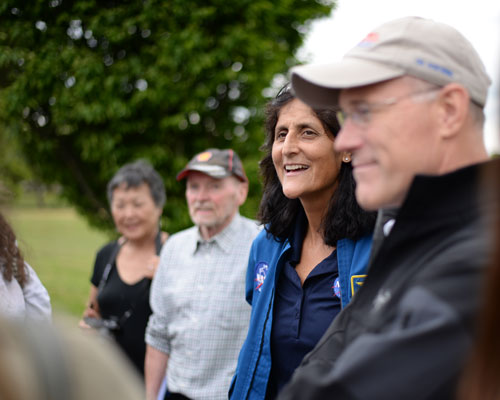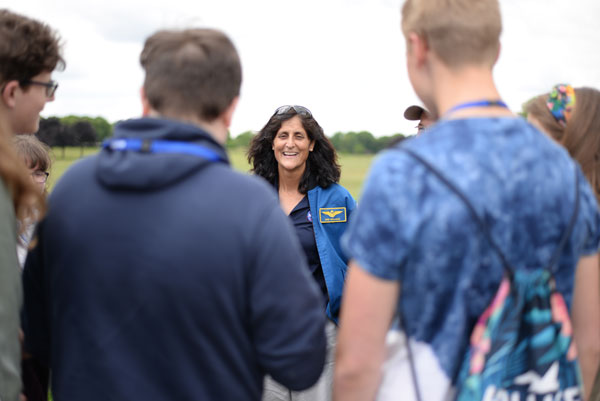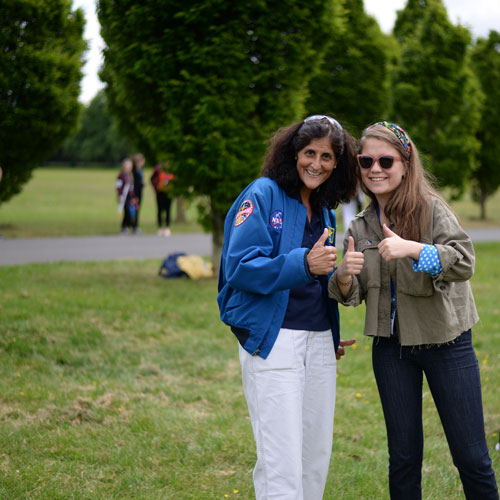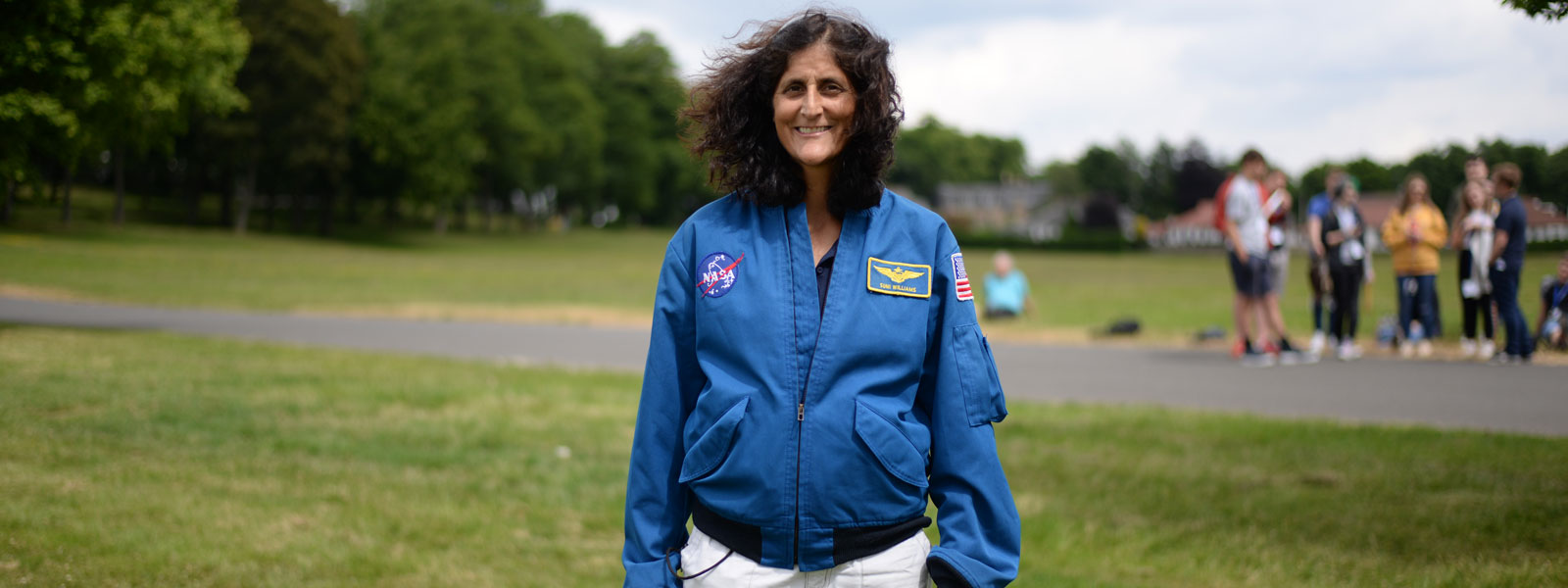Suni Williams was selected as an astronaut by NASA in 1998. Since then she’s completed two space mission expeditions and is currently assigned to the astronauts training to fly the initial test flights for America’s first commercially built spacecraft. Suni is visiting Strathclyde this week as part of Space School 2018 so we caught up with her while she’s here.

So, tell us a bit about yourself.
I’m a NASA Astronaut, I work at Johnson Space Centre.
I’ve had the privilege to go up to space two times; once up and down on a US space shuttle, and they left me at the International Space Station and I stayed there for about six months for my first increment. The next time was about five years later in 2012, I went on a Russian Soyuz up and down to the Space Station.
Right now, I’m training maybe fly one of the new commercial spacecraft, either a Space X Dragon or a Boeing Starliner. In the meantime, I have a little bit of time so it’s nice to be able to come here to Scotland and work with the students and see what they’re doing.
How did you come to work for NASA?
It’s always a little bit of a crazy path! There are some people who have that in their minds since a little child and pursue that. I’m not that smart or lucky; my path was a little different. I joined the Navy, and I was a Helicopter Pilot and then became a Test Pilot. When I was a Test Pilot that was the first opportunity I had to go to Johnson Space Centre and meet astronauts, see what they’re doing, and I was like:
wow that’s cool! I wanna do that!
So it wasn’t until my mid-twenties and I buckled down, focused, got my masters degree, and then applied and somehow got in!
What was it like to be selected as an astronaut?

I was on a Navy ship at the time when I got the call! It was jaw-dropping and all the folks around me were like 'No! You’re joking! I can’t believe it!' and I was like 'Yeah it’s true!'
I called my parents of course, and my husband and I think they couldn’t believe it at first but then going down to Johnson Space Centre, my husband and my mom both came with me, and I think then it was a reality for all three of us. I had to pinch myself.
What was it like going into space?
I think I was like “no way, it’s not going to happen”, it’s almost unbelievable until you’ve done it once.
When you’re sitting there and all the engines start up and you get propelled off the planet…I mean I was just laughing:
I was laughing and hootin’ and hollarin’, Oh My God we’re going, we’re going!
It was overwhelming and it’s so different from anything else that you do. Once you get to orbit which is only seven and a half/ eight minutes later and you’re floating, again I just started laughing like crazy, and then flew up to the flight deck, looked out the window and was like ‘wow’.
The impression of our planet is just spectacular.
Were you scared at all?
You know, I don’t think I was. More just excited and psyched. I mean, it’s like being on a rollercoaster. You’re in it, you’re there and it’s not like you’re like “oh I’m scared, I’m gonna get out”, there is no getting out! You’re in it, you’re on it, and I was more just excited for the experience.
So, what’s your job like?
Well, it’s not typical! If you’re interested in this and you don’t really want to work, this is the type of thing you need to do. It’s a lot of learning, of course, because you’re learning about all the different spacecraft, and once you start learning about aircraft or learning about a system, it’s all almost the same thing; it’s the same engineering methodology, so I gotta learn how the system works, how does it fly? How does it pull itself? How does it heat itself? How to the electronics work? And so those are the things we learn about in a classroom per se, and then utilise that in a simulator.
So, like the other day, I was in a simulator landing a Boeing Starliner and it was like “this is pretty cool!” and just knowing how all of the switches in the spacecraft work.
Other days we might be training for a spacewalk so I might be in this big pool called the Neutral Buoyancy Lab with the big white suit on, practising what we might do, or we might be doing some robotic simulation where we’re doing a track and capture of the cargo vehicles that come up to visit us.
Or we might be doing food tasting class to try the different types of food we might get up there and see how that works with your system, or we might figure out how to the toilet works and make sure we know how to fix that, so every day is different and every day on board the Space Station mirrors that.
You have to be one of these people who is adaptable, that’s one of the key components on why the training is so important because it mirrors what you’re going to do in space.
What was it like to spend six months in space?
I would say knock on wood lucky I was a military person and so I’d experienced deployments, I’d experienced going away from my family because I think that's probably the hardest part. Once you get there you’re pretty busy, and they keep you busy and you have to work out to maintain your bone density and muscle mass, so that’s part of the day as well and there’s always all these tasks that I’ve previously mentioned that are occupying your time, but remembering that you also leave a family behind and being able to make a phone call once a day or doing a video conference on the weekend is really nice. Those are the hardest parts about going away for that long.
What’s your favourite part about your job?

You know, honestly, I’ve been there for a little while. If I’d only been there for like five years I’d probably say ‘going into space again’ and it is really awesome to go into space, I’m excited about it, but when you talk to kids - and I’ve been doing this for a long time so I’ve been able to see kids who are like in middle school and then all of a sudden you see them graduate from college and then they’re going off in to some major career and you keep in touch with them, that is the coolest part. Then you see some of them become astronauts, like some of the newest class, some of them knew me when I flew on my first flight and then started doing stuff as a result of seeing how fun it is and that is the most rewarding part.
What subjects did you study in school?
Ugh, I wasn’t the greatest. In high school I did well, I loved science, physics was actually my favourite in high school. College was a different story. It was a step up a notch and it was a little bit harder for me, I really had to buckle down. I was in the middle of my class with moderate grades, and I think part of that was there was so much material and I didn’t see the application because when I went to test pilot school, right after that I got my masters degree, and I really saw the application of why math modelling is so important, so why the basics of math in the beginning you learn and then you can apply it and creatively try to understand how to apply maths to understand a problem and I loved it after that point and then I did well, so my masters I did fine.
That’s why this stuff [space school] is so important, the kids here are designing rockets, they’re given a template so they’re putting it all together but in that process, they’re understanding why making calculations and understanding the laws of physics are so important, so you apply it and that’s exactly why we do what we do.
What advice do you have for young people today?
Don’t be afraid to fail.
I’ve done it so many times. I quickly recapped how I became an astronaut but there were about five different, as I would have viewed them back then, failures. But they’re actually opportunities to see and do something that you never dreamed of.
I never thought I was going to go into the military, because I actually wanted to be a veterinarian, and I ended up stumbling into that by university selection. I also never wanted to be a Helicopter Pilot, I wanted to be a Jet Pilot but I didn’t get jets and I flew helicopters and that really made me wonder how they fly which brought me to test pilot school so my biggest advice is to try new and exciting things, you might do well, you might not, it’s okay because if you don’t you can try something else new and exciting, so be all you can be and go for it.
